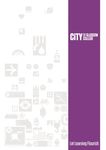Equality, Diversity & Inclusion Initiative 2017-2021 - City of ...
←
→
Page content transcription
If your browser does not render page correctly, please read the page content below
Contents
1. Introduction and our Commitment ......... 3
2. Context ........................................... 7
3. Alignment with Corporate Priorities ..... 13
4. Response to Statutory Equality Duties ... 19
5. Response to Other Statutory Duties ...... 25
6. Delivery of ED&I .............................. 27
7. Key ED&I Activities........................... 31
References......................................... 35
11. Introduction and our Commitment
The purpose of this initiative is to set out our commitment and approach to delivering
our corporate, moral and legal responsibilities for equality, diversity and inclusion
(ED&I). In doing so, the College will communicate what we want to achieve through
our equality outcomes and approach to embedding ED&I in all functions and
activities, i.e. mainstreaming. This involves the local ownership and delivery of ED&I
across the College, to make a positive difference to the lives of disadvantaged
groups. Sections of underlined text in the electronic version of this initiative are
active hyperlinks, often to additional resources. For example, for ease of
understanding, definitions of terms used are detailed within an ED&I Glossary.
City of Glasgow College is ranked top two in the UK for WorldSkills and composite overall
number one in the Scottish sector for success in student attainment in combined Further
and Higher Education. We are leading the way in tackling gender inequality within the
curriculum - our Women into Engineering course applications doubled in its second year
alone. Our college, like Scotland as a nation, is a melting pot of diversity, equality and
excellence. We deliver above average success rates for our students. Our innovative
approaches to teaching and learning enable personalised development across a range of
over 2,000 courses from Access Level to Masters. There are opportunities to study at a
level that encourages success and progression, enabling our students to reach their full
potential and improve their life chances, regardless of background or protected
characteristic. City of Glasgow College is a powerhouse of technical and professional
programmes ranging across six Faculties:
Building, Engineering & Energy. Education & Society.
Business. Leisure & Lifestyle.
Creative Industries. Nautical Studies.
2015-16 was a landmark year with the opening of our award winning Riverside campus on
the banks of the Clyde and our stunning City campus in the heart of Glasgow’s learning
quarter. Our twin site campus – our Super College - represents a multi-million
investment and is making a bold statement in creating a new era of tertiary education,
providing meticulously designed, industry standard, future-proofed learning and working
environments.
31.1. Definitions
Equality
Providing a level playing field for disadvantaged groups to ensure fairness
and foster respect.
The approach is centred on:
o Equality of opportunity (access).
o Equality of process (experience and treatment).
o Equality of outcome (achievement).
Diversity
Valuing everyone as a unique individual and celebrating this difference.
Managing diversity successfully will help organisations to nurture creativity
and innovation and thereby tap hidden capacity for growth and improved
competitiveness. After all, people perform better when they can be
themselves and their contributions are valued.
Inclusion
Social exclusion is the outcome of multiple deprivation, which prevents
individuals or groups from participating fully in the social, economic, and
political life of the society in which they live.
Inclusion in education is regarded as a process of addressing and responding
to the diverse needs of all learners through increasing participation in
learning, cultures and communities, and reducing exclusion.
(See references at end of document)
41.2. Commitment
Access and Inclusion
The College will encourage access and inclusion, and thus widen participation, by
recognising, prioritising and meeting the needs of individuals and groups which
comprise the communities the College serves. Some key enablers of access and
inclusion include:
Curriculum Design.
Marketing and Communications.
Community Engagement.
Student Recruitment and Selection.
Student Funding.
Student Services.
Student Learning Support.
HR Recruitment and Selection.
IT Infrastructure and Support.
Equality, Diversity & Inclusion Policy and Mainstreaming Vision
The College’s Equality, Diversity & Inclusion (ED&I) Policy details the aims,
scope and responsibilities for ED&I. The College’s Mainstreaming Vision is:
“To nurture an environment in which the equality, diversity and inclusion of
students, staff and visitors from all backgrounds are routinely anticipated,
expertly accommodated and positively celebrated.”
Equality, Diversity & Inclusion Statement
Equality, diversity & inclusiveness for all:
Fairness.
Opportunity.
Respect.
52. Context
Our strategic and operational approach to delivering ED&I within the College is
grounded upon the following legislative, strategic policy and best practice
requirements:
Relevant legislation, in particular the Criminal Law (Consolidation)
(Scotland) Act 1995, Equality Act 2010, Hate Crime Legislation, Human
Rights Act 1998, Protection from Harassment Act 1997 and Scotland Act
1998.
The social justice and business case for ED&I.
Scottish Government and related Scottish Funding Council (SFC), Skills
Development Scotland (SDS) and Glasgow College’s Regional Board (GCRB)
priorities, including Developing the Young Workforce, Commission for
Widening Access, Gender Action Plan and Equalities Action Plan.
New College Strategic Plan 2017-2025, with related aims and supporting
strategies, initiatives and plans.
2.1. Equality
The Equality Act 2010 streamlined, strengthened, and harmonised 40 years of
equality legislation and introduced a Public Sector Equality Duty (PSED) for all UK
public authorities. This duty is grounded upon eliminating unlawful conduct,
advancing equality of opportunity and fostering good relations across relevant
protected characteristics.
Devolved Specific Duties were introduced to enable authorities to better perform
the PSED. In Scotland, the Specific Duties 2012 and subsequent amendment 2016
place responsibilities upon the College to:
Report progress on mainstreaming the PSED.
Publish equality outcomes and report progress.
Assess and review the impact of policies and practices.
Gather and use employment information.
7 Publish gender pay gap information and publish statements on equal pay.
Consider award criteria and conditions in procurement.
2.2. Diversity
The need to account for diversity is implicit within the PSED. Indeed, having due
regard to the need to advance equality of opportunity involves taking steps to
meet the needs of students and staff from a range of protected characteristics.
Furthermore, having due regard to the need to foster good relations involves
promoting understanding.
The College recognises that persons who share a protected characteristic are not a
homogenous group, but instead have different experiences, needs and identities. It
is important for the College to embrace the fact that diversity will exist in many
ways and strive to harness the benefits of this diversity positively. Given this, the
College is committed to effectively managing, engaging with and celebrating the
diversity of its student and staff communities.
2.3. Access & Inclusion
A key priority of the Scottish Government is to achieve sustainable economic
growth. Within this context, delivering a high performing education and skills
system is an essential part of building the workforce required to maintain
economic competitiveness.
In Developing the Young Workforce, the Scottish Government makes the case for
synergy between employment in fair work and social mobility within a fair society
which supports a strong economy. The Scottish Government’s commitment is to
continue to focus action to reduce youth unemployment and in doing so to address
the inequalities different groups of young people experience as they seek to move
into the workforce.
In the Final Report of the Commission for Widening Access, the Scottish
Government sets out its ambitions to remove the barriers preventing children born
in areas of deprivation from having the same chances of entering further and
higher education as a child born in one of our most affluent communities.
8Scottish Education, a predominantly publicly funded asset, disproportionately
benefits those in our most affluent communities, meaning that people from those
most disadvantaged communities do not have an equal chance to realise their
potential. The Government argues that access is an issue of fairness and that
Scotland has a moral, social and economic duty to tackle this inequality.
The College is committed to tackling and minimising barriers to education and
employment, particularly for the most vulnerable groups. Furthermore, the
relationship between the socioeconomic status and deprivation of student groups is
examined using the Scottish Index of Multiple Deprivation, SIMD. This data is
presented within the College’s Annual Review. Please refer to Section 3.5 for
more details.
2.4. Equality, Diversity & Inclusion are Inter-related.
Whilst, to a large degree, “diversity” is a reality which exists without any
intervention, “equality” and “inclusion” require conscious commitment to achieve.
Research demonstrates that there is a clear overlap between protected
characteristic and Access & Inclusion groups. For example, people with certain
protected characteristics are more likely to be residents of areas of multiple
deprivation, e.g. disabled, BME groups and asylum seekers. (EHRC, 2011 and 2015;
Riddell, 2009; Riddell, et al., 2010; and Topping, 2012).
According to the EHRC, young disabled people, care leaves and young people from
black and ethnic minorities are significantly more likely to experience
unemployment than their peers outwith these groups. (EHRC, 2015).
It is this interplay of factors which combine to affect the experience of particular
groups and the reason why an integrated approach is required to remove
disadvantage, meet needs and increase participation.
92.5. Benefits of ED&I
According to research, there are 7 main benefits of ED&I:
(Baker, et al., 2009; CIPD, 2017; Frost, 2014; UK Government, 2013)
These benefits are: Moral & Ethnical; Legal; Staff; Customer; Decision Making;
Productivity; and Reputation.
In summary, an organisation which effectively commits to and manages ED&I
results in: real people benefits; improved corporate performance; and an
enhanced reputation.
1011
3. Alignment with Corporate Priorities
123. Alignment with Corporate Priorities
This section will detail how the College has responded to meet its corporate
responsibilities for ED&I. Please refer to the College website for more details.
3.1. Alignment with National and Regional Priorities
City of Glasgow College’s ED&I activities are aligned with and support the priorities
of the Scottish Government, Scottish Funding Council (SFC), Skills Development
Scotland (SDS), and the Glasgow Colleges Regional Board (GCRB).
Developing the Young Workforce
Our College will work with the Glasgow Region Developing Scotland’s Young
Workforce lead to support delivery of the recommendations of the Commission for
Developing Scotland’s Young Workforce, including actions to improve gender
balance and increase the intersectional benefits for other protected groups.
Gender Action Plan
Each College in Scotland has been tasked by the Scottish Funding Council (SFC)
with developing its own Gender Action Plan (GAP) to tackle those subjects with the
greatest gender imbalance.
Positive actions to tackle gender under-representation were incorporated into the
College’s Equality Outcome Framework 2017-2021 as Equality Outcome 1.1:
“Student representation of gender in courses currently characterised by significant
imbalance of over 90% is increased by 5% between 2017-2021”.
To support achieving this outcomes, a specific Gender Action Plan 2017 - 2021
has been devised. Key to planning, delivering and evaluating an effective and
robust framework are: leadership; governance; and planning and performance.
Progress will be presented within the Progress in Achieving Equality Outcomes
Report (next due in 2019 and 2021).
13Equality Action Plan
Each training provider in Scotland, including the College, has been tasked by Skills
Development Scotland (SDS) with developing its own Equality Action Plan (EAP).
The purpose of the EAP is to improve the participation of disabled, Black Minority
Ethnic (BME) groups and care-leavers in Modern Apprenticeships, as well as
addressing gender imbalance within the uptake of occupational frameworks.
To support achieving this, an annual Equality Outcome Plan has been produced by
the Workforce Development Team, with support from the ED&I Team.
Education Scotland Quality Framework
The new Education Scotland Quality Framework, How Good is Your College?,
provides a structure for evaluation and enhancement which colleges, together with
their stakeholders, can use to identify what is working well and what needs to be
improved. The framework, designed to ensure the best possible outcomes for all
learners, includes two quality indicators supported by this ED&I Initiative:
Wellbeing, Equality and Inclusion.
This indicator examines the following themes:
Statutory duties.
Inclusion and equality.
Equity, Attainment and Achievement for all Learners.
This indicator examines the following themes:
Learner success over time.
Essential skills, including skills for life and work.
Equity for learners.
14Glasgow Regional Equality Outcome Themes
Under the direction of Glasgow Colleges Regional Board (GCRB), the 3 Glasgow
Colleges are committed to serving a regional College student population which
reflects the diversity of the region and demonstrates regional commitment to
widening access through the delivery of a coherent regional curriculum.
To support a coherent regional approach, the colleges have jointly developed 5
shared regional equality outcome themes, as outlined in the Glasgow Regional
Outcome Agreements. Our College has developed an Equality Outcome
Framework 2017-2021, with specific actions and measures, to support the
achievement of these regional outcome themes. Please refer to Section 4.2 for
more details.
3.2. Alignment with College Strategic Aims 2017-2025
The ED&I Working Group identified that ED&I activity supports achieving the
following strategic priorities and aims:
Theme: Students
1. To be an inspirational place of learning.
1.1. Ensure that the student experience of the College is inspirational.
1.3. Foster excellence and innovation in learning and teaching.
2. To enable individuals to excel and realise their full potential.
2.2. Realise sector leading levels of student satisfaction with learning and
teaching.
2.3. Provide access and progression opportunities for all, through a broad,
industry relevant curriculum for work and advanced study.
2.4. Support and develop student engagement in all aspects of the student
experience.
15Theme: Growth and Development
3. To live our values, value our people, and innovate in partnership.
3.1. Match staff turnover and recruitment to meet strategic needs.
3.2. Achieve a healthy, supportive, and collaborative working environment.
3.3. Ensure staff support and promote the College Purpose, Values and
Behaviours.
3.4. Advance Fairness, Opportunity and respect for all.
Theme: Performance and Processes
5. To deliver excellence in performance.
5.2. Achieve excellent Education Scotland reportage annually.
5.4. Ensure the achievement of globally recognised benchmarks for College
processes.
3.3. Alignment with College People & Culture Strategy
The College’s People & Culture Strategy was informed by staff engagement and
feedback. The Strategy presents how the College is committed to leading,
supporting and managing staff to achieve excellent service and sustainable results.
Aim 4 of the strategy, “Retain”, states the importance creating an inclusive
environment - through fairness, opportunity and respect - to achieve employee
retention.
3.4. Alignment with College Student Experience Strategy
The College’s Student Experience Strategy sets out a commitment to be a College
where “Individual needs are anticipated at every step of the student journey and
are met in a proactive and meaningful way”.
Aim 6 of the strategy, “Access, Inclusion and Wellbeing”, emphasises the
importance of creating an inclusive environment – throughout the student journey
16- that anticipates and supports students’ needs through excellent advice guidance
and support.
3.5. Alignment with College Access & Inclusion Strategy
Following the findings of the Commission for Widening Access, the College
devised its Access & Inclusion Strategy 2016-2020, presenting our ambition and
approach to access and inclusion. The strategy states the College’s aim to
“anticipate individual need, identify barriers to participation and eliminate or
mitigate these to ensure that everyone gets a fair and equal opportunity to an
outstanding student experience”.
The ambition of the strategy is to create a learning environment which:
Advances access for all.
Provides a positive, engaging student experience and fosters good relations
between students and staff.
Enhances retention and success through inclusive practices.
Presents progression to further study or employment.
The strategy presents an “Access and Inclusion” map to illustrate how access and
inclusion permeates across all College functions. In doing so, the initiative
recognises the College’s ED&I responsibilities for students and staff and alignment
with access and inclusion activities.
174. Response to Statutory Equality Duties
184. Response to Statutory Equality Duties
Statutory Equality Reports are published on the College website, together with a
summary of the Equality Act 2010 duties.
4.1. Equality Mainstreaming
The College regards mainstreaming as the local ownership and delivery of equality,
diversity and inclusion across all College functions and activities.
To enable this, the College devised a mainstreaming vision to support embedding
ED&I across its strategy and operations. This vision is:
“To nurture an environment in which the equality, diversity and inclusion of
students, staff and visitors from all backgrounds are routinely anticipated,
expertly accommodated and positively celebrated.”
In response to the Specific Duties, the College will publish a full equality
mainstreaming report every two years (next due 2019 and 2021) on the progress
made to make the PSED integral to its functions. In addition, the College will detail
the steps taken to collect and use equality data to better perform the PSED,
together with its approach to mainstreaming the PSED across functions, within an
interim report, published every other year (next due in 2018 and 2020). Together,
the Equality Mainstreaming Report and Interim Equality Mainstreaming Report
are designed to enable the College to better progress the PSED year on year.
4.2. Equality Outcomes
Where mainstreaming can provide a vision and model for delivery, equality
outcomes can provide a measure of change. In this context, equality outcomes can
be regarded as the strategic and operational expression of the improvements and
positive changes associated with equality mainstreaming. These describe what we
want to see at City of Glasgow College. The Specific Duties place a responsibility
on the College to prepare and publish a set of equality outcomes every four years
(next due in 2021). In addition, a published report detailing progress in achieving
these outcomes is required every two years (next due in 2019 and 2021).
19To present and deliver these outcomes, an Equality Outcome Framework 2017-
2021 and an Equality Outcome Progress Plan have been developed. To ensure
that outcomes are delivered as intended, the outcome progress plan will be
regularly reviewed, updated and published on the College website.
Our College’s equality outcomes are aligned with the Glasgow regional equality
outcome themes, as detailed in Table 1.
4.3. Staff and Board of Management Information
In Scotland, the Equality Act 2010 Specific Duties place a responsibility on the
College to: take steps to gather information on the number and relevant protected
characteristics of staff by composition, recruitment, development and retention;
and use this information to better perform the PSED. The gender breakdown of
board members is also required, together with how this information is used to
better perform the PSED and increase the diversity of board members.
The breakdown of equality data collected, details of progress made in gathering
data and how that information has been used to better perform the PSED are to be
presented within the equality mainstreaming report.
The College will publish a full equality mainstreaming report, including steps taken
to collect and use equality data, every two years (next due 2019 and 2021). In
addition, the College will detail the steps taken to collect and use equality data,
together with its approach to mainstreaming the PSED across functions, within an
interim report, published every other year (next due in 2018 and 2020).
Together, the Equality Mainstreaming Report and Interim Equality
Mainstreaming Report allow staff equality data to be presented annually so as to
enable the College to better progress the PSED year on year.
4.4. Assessing Impact
In meeting the Specific Duties, the College will assess the impact of applying a
proposed new or revised policy or practice, make any revisions to ensure
compliance with the PSED and publish results within a reasonable time period. To
meet these requirements, the College has agreed and devised:
20 A policy protocol document which includes guidelines and responsibilities for
conducting an Equality Impact Assessment (EQIA).
Guidance to teams responsible for policies and procedures.
An electronic procedure for undertaking an EQIA.
A quality flow system to ensure EQIAs are undertaken are required.
A system to audit a selection of EQIAs to ensure consistency in approach.
A section on the College website for publishing completed assessments.
4.5. Equal Pay Statement and Information
In meeting the Specific Duties, the College will publish gender pay gap information
in relation to the difference in salaries between men and women every two years
(next due in 2019 and 2021).
This analysis will present the percentage difference among staff between men’s
average hourly pay and women’s average hourly pay. Subsequently, these data will
be used to inform the equal pay statement in relation to men and women.
The College will prepare and publish an equal pay statement every four years (next
due in 2021). This statement will specific the College’s equal pay policy in relation
to sex, disability and race and include information on occupational segregation,
again in relation to sex, disability and race. The latest statement and information
is published within the Equal Pay Statement and Information Report 2017.
4.6. Procurement
The specific duties also place specific responsibilities on the College in relation to
procurement. This states that, when relevant and proportionate to the subject
matter of an agreement for goods, works, or services, the College should have due
regard to whether the award criteria of the agreement, and the contract
conditions should include considerations relevant to its performance of the PSED.
The College’s procurement strategy, policy and procedure have been developed
to explicitly account for this requirement.
21Table 1: Alignment with Regional Equality Outcome Themes
A series of actions, outputs, impact measures and targets have been identified for
each outcome. Please refer to the Equality Outcome Framework 2017-2021 for
more details.
Glasgow Regional Equality City of Glasgow College’s Equality Outcomes
Outcome Themes
1. The diversity of students 1.1. Student representation of gender in courses
and staff reflects the characterised by significant imbalance is redressed.
communities the College
serves.
2. All students and staff 2.1. Students and staff – across all protected characteristics -
experience and contribute experience and contribute to a culture of dignity and
to a culture of dignity and respect.
respect.
3. All students and staff 3.1. Disabled students and staff confidently access relevant
benefits from inclusive and facilities and support.
accessible spaces, 3.2. LGBTQ+ students and staff confidently access relevant
environments and services. facilities and support.
3.3. Students and staff with religious beliefs confidently
access relevant facilities and support.
4. All students and staff 4.1. The diversity of student identities, experiences and
actively engage in fully needs is accounted for in the design and delivery of
inclusive and accessible Learning & Teaching.
learning. 4.2. The diversity of staff identities, experiences and needs
is accounted for in the design and delivery of Learning
& Development.
5. Successful student and staff 5.1. The successful course completion of students – across
outcomes are increased all protected characteristics - is increased.
irrespective of protected 5.2. The completion of Learning & Development is
characteristics. increased for support staff, younger, older and
pregnant staff.
2223
5. Response to Other Statutory Duties
245. Response to Other Statutory Duties
In addition to equality legislation, other related statutory duties place
responsibilities on the College which support access and inclusion.
5.1. Corporate Parenting Plan
The College is a Corporate Parent as defined by the Children and Young People
(Scotland) Act 2014. As a Corporate Parent, the College has specific
responsibilities for care-experienced young people who are attending College to
ensure that the support and opportunities provided by any parent to their child are
offered to them.
As a group, care-experienced young people do not have the same life chances as
their peers and studies have shown that this group are more likely to become
vulnerable to a range of socioeconomic disadvantages including offending
behaviour and health problems.
Our Corporate Parenting Plan sets out how we aim to achieve this for our care-
experienced young people from Glasgow and beyond.
5.2. British Sign Language (BSL) Plan
The British Sign Language (Scotland) Act 2015 places a duty on Scottish Ministers
to promote the use and understanding of British Sign Language (BSL) and requires
Scottish Ministers to prepare and publish BSL national plans.
The first national plan was published by 22nd October 2017 and is published
in BSL and in English. National plans have to be published every six years.
Other public bodies, including colleges and universities, local councils and health
boards, will then have to publish their “authority” plans by October
2018. These plans should follow the lead taken by the Scottish Government on
the National Plan and use a similar template.
The College has already begun developing its authority plan, informed through
student and staff engagement.
256. Delivery of ED&I
266. Delivery of ED&I
The ED&I Team Operational Plan details objectives, with specific actions and
targets. Central to the effective mainstreaming of ED&I and achievement of
equality outcomes across College functions are:
Strategic management and operations. To fulfil the College’s moral, legal and
corporate requirements for ED&I across its strategy and operations, various
structures and staff groups have been established.
Data and evidence consideration. In support of meeting the PSED, the College
is required to consider evidence in relation to groups who share a relevant
protected characteristic when:
1. Publishing equality outcomes and reporting on progress.
2. Developing, assessing and reviewing policies and practices.
3. Gathering and using information on the composition, recruitment,
development and retention of employees.
Student, staff and community engagement and involvement. The College
involves individuals and groups representing a range of protected
characteristics in discussions and decision making procedures across its
operations and services.
6.1. Strategic Management and Operations
Students, Staff and Equalities Committee of the Board of Management:
provides strategic direction and a structure for the governance of ED&I.
Equality, Diversity & Inclusion Advisory and Engagement Group: comprised of
representatives of external equality groups, key senior teaching and support
staff, together with student representation. This group informs and supports
College ED&I Initiative and related operations and provides advice on legislative
compliance and best practice.
Equality, Diversity & Inclusion Working Group: comprised of teaching and
support staff, together with student representation. This group supports the
27development of the College’s ED&I Initiative and related operations,
mainstreaming efforts and equality outcomes.
Equality, Diversity & Inclusion Team: comprised of the ED&I Manager and ED&I
Officer. This Team provides leadership, support and advice for the College’s
ED&I Initiative and related and operations. Internally, the Team produces a
Balanced Scorecard to set priorities and an annual Operational Plan and self-
evaluation, addressing these priorities, with periodic progress reports on
actions, measures of success and Key Performance Indicators (KPIs). Externally,
the Team produces statutory reports which detail the College’s progress in
meeting its legislative duties.
College and local strategy and operations: at a local level, managers devise
Operational Plans to deliver on ED&I mainstreaming initiatives and progressing
equality outcomes.
6.2. Data and Evidence Consideration
Staff surveys and focus groups, are undertaken with specific ED&I questions.
Course Action and Improvement Meetings (CAIMs) and student surveys are
conducted. These examine fairness and equality in admissions, services,
learning, support and guidance. CAIMs incorporate student class representative
participation to examine how ED&I has been embedded within learning and
teaching.
The staff recruitment & HR software system will be updated in 2018 to
further enhance data collection across all protected characteristics in relation
to the composition, recruitment, development and retention of staff.
The student application and enrolment system, in accordance with SFC
requirements, collects and examines data across: age; disability; gender
identity and reassignment; race (ethnicity and nationality); religion; sex; and
sexual orientation.
Formal student complaint and staff grievance investigations are conducted,
some of which have a particular equality focus in relation to specific protected
characteristics.
286.3. Student, Staffing and Community Involvement and
Engagement
The College involves individuals and groups representing a range of protected
characteristics during discussions and decision making procedures across its
operations and services. These include the following internal and external sources:
Students, Staff and Equalities Committee of the Board of Management:
provides strategic direction and a structure for the governance of ED&I.
Equality, Diversity & Inclusion Advisory and Engagement Group informs and
supports College ED&I Initiative and related operations and provides advice on
legislative compliance and best practice.
Staff with responsibilities for ED&I attend various committees, working
groups, Senior Management Team and support staff meetings to share good
practice.
The Student Executive, Equalities Officers and class representatives are
elected by students to serve and meet the diverse needs of students.
Staff surveys and focus groups are undertaken including specific questions on
ED&I.
Student Surveys and Course Action and Improvement Meetings (CAIMs) are
undertaken, with representation from students which examine fairness,
opportunity and respect in relation to the student experience.
Involvement from groups representing protected characteristics, and
reference to equality data, are central to conducting EQIAs.
Student needs assessments are conducted by Student Development staff in
conjunction with students who have an additional support need (ASN) to
determine reasonable adjustments and identify support required. Personal
Learning Support plans (PLSPs) are then created to record and deliver these
adjustments.
297. Key ED&I Activities
307. Key ED&I Activities
This section presents a brief overview of some of the key activities delivered in
support of this ED&I initiative. Further information is available on the ED&I
section of our College website.
7.1. Accreditations and Support Services
The College demonstrates its commitment to ED&I through a range of accreditation
standards. In the Equal Pay Statement & Information Report, the College pledged
to becoming a Disability Confident Employer by April 2019 and Disability
Confident Leader by April 2021. The College is an Investors in Diversity
accredited organisation and, in future, will be aiming for Leaders in Diversity. We
are Stonewall Diversity Champion and take part in the annual Workplace Equality
Index, which benchmarks our progress in relation LGBT inclusion in the workplace.
In 2018, the College came 110th in the UK, out of 434 participation organisations.
Our engagement with best practice support services aid our mainstreaming duties
and assist in equalities of outcomes for all. For example, a range of enabling
assistive technologies are provided to students and staff, including screen reader
and mind mapping software. Browealoud is available throughout the College
website, staff intranet and student Virtual Learning Environment. DisabledGo
Access Guides, embedded throughout our website, provide summary information
on how to access the College buildings and internal services. Furthermore, we are
a member of Tommy's Pregnancy at Work Scheme, equipping us with the tools to
provide the best level of support for pregnant employees and their managers. Our
Chaplaincy Team and Quiet Reflection Room support the diverse spiritual needs
of the College’s students and staff and help celebrate various dates throughout the
year. We have representatives from a range of faith communities, including the
Humanist Society. The Team plans to have a consistent engagement with student
and staff populations via a presence at the Freshers’ Fayre, an Interfaith
Roadshow, a presence at Student Services events and monthly Taste of Faith
events. Additionally, each year the College supplies staff with a Diversiton
diversity calendar, which highlights key faith dates throughout the year, and
supporting religious e-books.
317.2. Staff and Student Development and Engagement with
ED&I
All staff at the College undergo ED&I Learning & Development when they start in
their role. This involves an online ED&I module and a complementary face-to-face
ED&I session. There is an equivalent module for students to complete. Once staff
have completed their module, staff are invited to complete their equalities
monitoring information and pledge not to be a bystander, which awards them with
our ED&I Digital Badge. Over a third of staff have achieved their ED&I badge and,
in doing so, have contributed to greatly improving our equality monitoring
declaration rates.
To supplement learning, staff receive 3 copies of Diverse City, our ED&I
newsletter, each academic session. This presents features covering a range of ED&I
related issues.
Other staff development opportunities include Managing/Working with Diverse
Teams, Scottish Mental Health First Aid and development around specific
protected characteristics. Additionally, development is offered around our CALM
(Creating Accessible Learning Materials) project, which empowers staff to create
and maintain accessible and inclusive electronic “CALM Compliant” materials and
approaches. CALM is aligned to City Learning 4.0 and the Student Experience
Strategy.
Staff and students are given the opportunity to engage with ED&I through our
Cross-College Themed Events. From October to April, activities are arranged
around specific protected characteristics, which also tie into national events, such
as Black History Month and LGBT History Month. Activities include library
collections, panel discussions, quizzes, stalls, workshops and events organised with
external partners. Staff are encouraged to embed activities locally.
Further, the college holds the annual Embracing Diversity Competition, which
encourages students to creatively explore ED&I within the range of courses offered
throughout the curriculum, and to express this in a format of their choice. This
encourages grass-roots level engagement with ‘Fairness, Opportunity and Respect’
and the number of entries has increased annually.
3233
References
34References
BAKER, J.; LYNCH, K., CANTILLON, S. and WALSH, J. (2009) “Equality: From
Theory to Action” (Palgrave MacMillan: Basingstoke).
CIPD (2017) “Diversity in the Workplace”; available online via:
https://www.cipd.co.uk/knowledge/fundamentals/relations/diversity/factshe
et#6424
ERHC (2011) “The First Triennial Review”; available on line via:
http://www.equalityhumanrights.com/uploaded_files/triennial_review/how_f
air_is_britain_-_complete_report.pdf
EHRC (2015) Is Scotland Fairer? The state of Equality and Human Rights 2015
(London: EHRC). Available on line via
https://www.equalityhumanrights.com/en/britain-fairer/scotland-fairer-
introduction/scotland-fairer-report
EHRC (2016) “Equality Outcomes and the Public Sector Equality Duty”; available
online via:
https://www.equalityhumanrights.com/sites/default/files/2._equality_outco
mes_-_formatted_0.pdf
EHRC (2017) “Glossary of Terms”; available online via:
https://www.equalityhumanrights.com/en/secondary-education-resources/useful-
information/glossary-terms
GLASGOW REGION AGREEMENT (2016/17) Summary of Outcomes, Impacts, and
Outputs. Available online via:
http://www.sfc.ac.uk/web/FILES/Funding_Outcome_Agreements_2015-
16/Glasgow_OA_2015-16_Summary.pdf
FROST, S. (2014) “The Inclusion Imperative: How real Inclusion Creates Better
Business and Builds Better Societies” (Kogan Press, London); available on line,
using CoGC staff log in details, via:
https://www.dawsonera.com/Shibboleth.sso/Login?entityID=https://idp.cityof
glasgowcollege.ac.uk/idp/shibboleth&target=https://www.dawsonera.com/shi
35bboleth/ShibbolethLogin.html?dest=http://www.dawsonera.com/depp/reader
/protected/external/AbstractView/S9780749471309
GLASGOW REGION AGREEMENT (2016/167 Summary of Outcomes, Impacts, and
Outputs. Available online via:
http://www.sfc.ac.uk/web/FILES/Funding_Outcome_Agreements_2015-
16/Glasgow_OA_2015-16_Summary.pdf
RIDDELL, S. (2009) “Social justice, equality and inclusion in Scottish education”;
Discourse (30,3: 283-297); Available on line via:
http://www.docs.hss.ed.ac.uk/education/creid/projects/16xi_esrc_pub_socju
s_sr.pdf
RIDDELL, S. ET AL. (2010) “Disability, Skills and Employment: A Review of Recent
Statistics and Literature on Policy and Initiatives”; EHRC Research Report 5;
Available on line via:
http://www.equalityhumanrights.com/sites/default/files/documents/research
/disability_skills_and_employment.pdf
SAVOIE, ERNEST J. and SHEEHAN, MAUREEN. (2001) “Highlights of the
Conference Diversity in the Workplace: Challenges and Opportunities”, in
Diversity in the Workplace: Challenges and Opportunities (Wayne State
University Press: Michigan).
SCOTTISH FUNDING COUNCIL (2016a) Gender Action Plan. Available on line via:
http://www.sfc.ac.uk/web/FILES/Corporate_publications_SFCCP052016_Gend
erActionPlan/SFCCP052016_Gender_Action_Plan.pdf
SCOTTISH FUNDING COUNCIL (2016b) Review of Extended Learning Support –
Final Report. Available online via:
http://www.sfc.ac.uk/web/FILES/Corporate_publications_SFCCP032016_Revie
wofExtendedLearningSupportFinalR/SFCCP032016_Review_of_Extended_Learni
ng_Support.pdf
SCOTTISH GOVERNMENT (2016) The Final Report of the Commission on Widening
Access March 2016. Available on line via:
http://www.gov.scot/Resource/0049/00496535.pdf
36TOPPING, K. (2012) “Conceptions of inclusion: widening ideas”; in C Boyle & K
Topping (eds), What works in inclusion? (Open University Press, Maidenhead).
Available online through this link.
UK GOVERNMENT (2013) “The Business Case for Diversity” (Department for
Business Innovation & Skills, Equalities Office). Available online through this
link
UNESCO (2005) “Guidelines for Inclusion: Ensuring Access to Education for All”.
Available online through this link.
3738
39
You can also read



























































